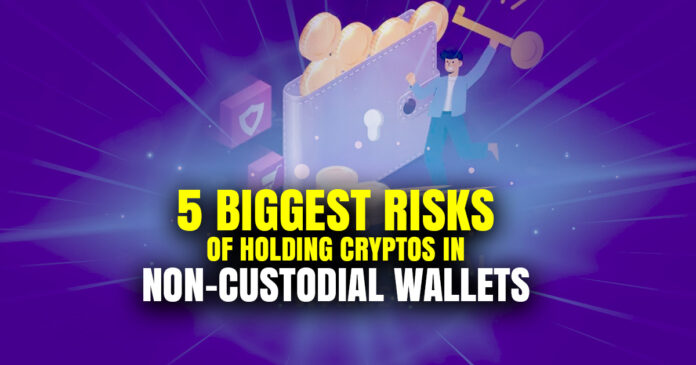While custodial wallets, where third-party services manage your private keys, offer convenience. However, non-custodial wallets provide users with complete control over their funds.
However, non-custodial wallets also come with inherent risks that users should be aware of to safeguard their investments.
Let’s discover 5 very important risks you should know about:
1. Loss of Private Keys
Non-custodial wallets rely on private keys for access to cryptocurrencies. These private keys are highly sensitive and must be kept confidential. Losing your private keys is akin to losing your access to your cryptocurrencies, as they cannot be recovered without them.
2. Technical Vulnerabilities
Non-custodial wallets, like any software, are susceptible to vulnerabilities that could be exploited to steal funds. These vulnerabilities can arise from bugs in the wallet software or from security flaws in the underlying infrastructure.
3. Physical Damage to Storage Devices
Non-custodial wallets often store private keys on physical devices, such as USB drives or hard drives. Physical damage to these devices can result in the loss of private keys and access to cryptocurrencies.
4. Phishing and Malware Attacks
Phishing attacks attempt to trick users into revealing their private keys or sending funds to fraudulent addresses. Malware can also be used to infect devices and steal private keys.
5. User Error
Even the most secure non-custodial wallets can be compromised due to user error. Mistakes such as sending funds to the wrong address or accidentally deleting private keys can lead to irreparable losses.
Comparison among non-custodial wallets. pic.twitter.com/IAqnZrUDZp
— Coin98 Insights (@Coin98Insights) November 16, 2022
5 Tips to Avoid Losing Funds in Non-Custodial Wallets
-
Store private keys offline: Keep your private keys offline and disconnected from the internet to minimize the risk of hacking. Consider using hardware wallets or paper wallets for enhanced security.
-
Create backups and store them separately: Create multiple backups of your private keys and store them in separate secure locations. This ensures that you have a backup if one copy is lost or damaged.
-
Be cautious of links and attachments: Never click on suspicious links or open attachments from unknown senders. Phishing attempts are often disguised as legitimate emails or messages.
-
Use reputable non-custodial wallet software: Choose non-custodial wallets from reputable developers with a proven track record of security. Regularly update your wallet software to address any vulnerabilities.
-
Educate yourself about cryptocurrency security: Stay informed about the latest security threats and best practices for protecting your cryptocurrencies. Read security guides, follow trusted sources, and participate in cryptocurrency communities.
Self-custody solutions help reduce the risk of trusting centralized entities with your #crypto.
Here's a video tutorial from @RGottleber on how to store #Ethereum-based tokens in @Ledger, @MetaMask, and @Trezor non-custodial wallets 🔐https://t.co/iegkS23S0M
— Chainlink (@chainlink) November 15, 2022
Conclusion
While non-custodial wallets offer users greater control over their cryptocurrencies, they also come with inherent risks. By understanding these risks and following the recommended tips, users can significantly reduce the chances of losing their funds and protect their valuable crypto assets.
Disclaimer
The information discussed by Altcoin Buzz is not financial advice. This is for educational, entertainment, and informational purposes only. Any information or strategies are thoughts and opinions relevant to the accepted levels of risk tolerance of the writer/reviewers and their risk tolerance may be different than yours. We are not responsible for any losses that you may incur as a result of any investments directly or indirectly related to the information provided. Bitcoin and other cryptocurrencies are high-risk investments so please do your due diligence. Copyright Altcoin Buzz Pte Ltd.





























